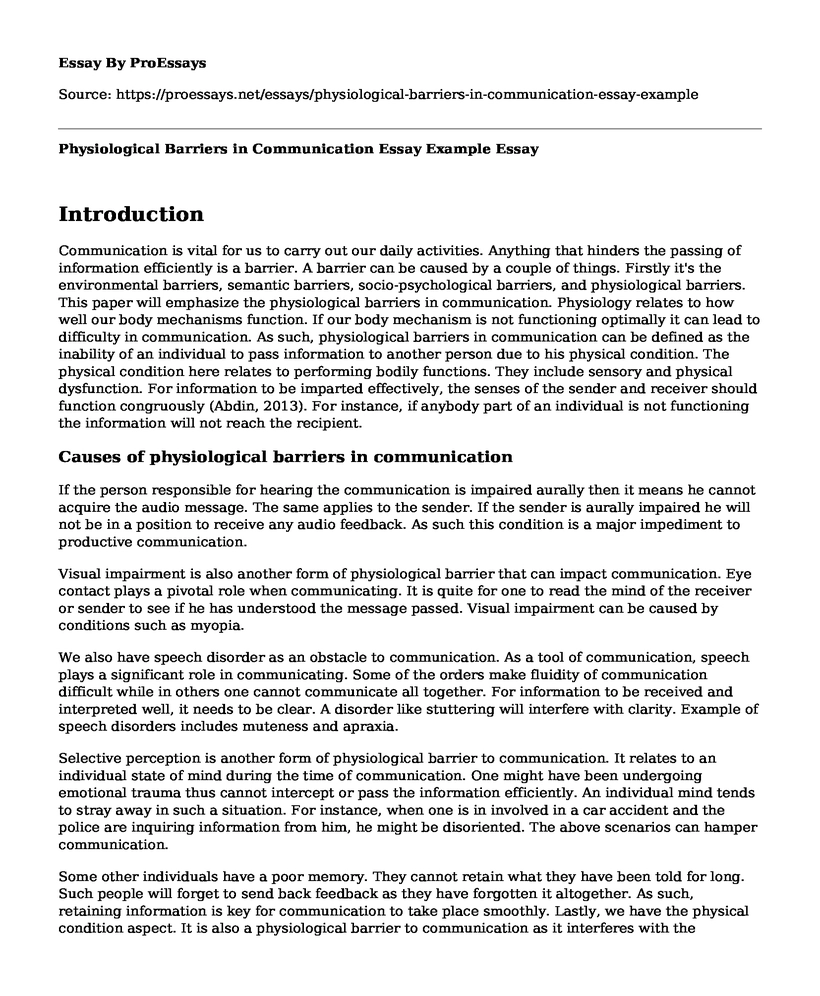Introduction
Communication is vital for us to carry out our daily activities. Anything that hinders the passing of information efficiently is a barrier. A barrier can be caused by a couple of things. Firstly it's the environmental barriers, semantic barriers, socio-psychological barriers, and physiological barriers. This paper will emphasize the physiological barriers in communication. Physiology relates to how well our body mechanisms function. If our body mechanism is not functioning optimally it can lead to difficulty in communication. As such, physiological barriers in communication can be defined as the inability of an individual to pass information to another person due to his physical condition. The physical condition here relates to performing bodily functions. They include sensory and physical dysfunction. For information to be imparted effectively, the senses of the sender and receiver should function congruously (Abdin, 2013). For instance, if anybody part of an individual is not functioning the information will not reach the recipient.
Causes of physiological barriers in communication
If the person responsible for hearing the communication is impaired aurally then it means he cannot acquire the audio message. The same applies to the sender. If the sender is aurally impaired he will not be in a position to receive any audio feedback. As such this condition is a major impediment to productive communication.
Visual impairment is also another form of physiological barrier that can impact communication. Eye contact plays a pivotal role when communicating. It is quite for one to read the mind of the receiver or sender to see if he has understood the message passed. Visual impairment can be caused by conditions such as myopia.
We also have speech disorder as an obstacle to communication. As a tool of communication, speech plays a significant role in communicating. Some of the orders make fluidity of communication difficult while in others one cannot communicate all together. For information to be received and interpreted well, it needs to be clear. A disorder like stuttering will interfere with clarity. Example of speech disorders includes muteness and apraxia.
Selective perception is another form of physiological barrier to communication. It relates to an individual state of mind during the time of communication. One might have been undergoing emotional trauma thus cannot intercept or pass the information efficiently. An individual mind tends to stray away in such a situation. For instance, when one is in involved in a car accident and the police are inquiring information from him, he might be disoriented. The above scenarios can hamper communication.
Some other individuals have a poor memory. They cannot retain what they have been told for long. Such people will forget to send back feedback as they have forgotten it altogether. As such, retaining information is key for communication to take place smoothly. Lastly, we have the physical condition aspect. It is also a physiological barrier to communication as it interferes with the functioning of the body mechanism. When one is suffering from an ailment he cannot communicate fluidly. Some organs which are key in communication might have been affected by the disease. When one is sick the method via which communication is passed can be changed thus affecting the quality of information. Also, when one has a sore throat the clarity of the voice is affected thus the recipient might not get the required information.
References
Abdin, J. (2013). The Barriers of Communication & Guidance of Effective Communication. SSRN Electronic Journal. Doi: 10.2139/ssrn.1133343
Cite this page
Physiological Barriers in Communication Essay Example. (2022, Dec 04). Retrieved from https://proessays.net/essays/physiological-barriers-in-communication-essay-example
If you are the original author of this essay and no longer wish to have it published on the ProEssays website, please click below to request its removal:
- Darkness Visible by Styron - Book Review Example
- Problems of Vulnerable Populations Essay
- Thank You For Your Generous Contributions: A Heartfelt Appreciation
- Essay on Michael Kuo: Resisting Myths, Confronting Challenges, Finding a Savior
- Gentrification: Transforming Neighborhoods Into Vibrant Communities - Essay Sample
- Essay Example on Eisenhower & Kennedy: Protecting Civil Rights for African Americans
- Tarana Burke: Activist Fighting Social Injustices and Gender Equality - Essay Sample







